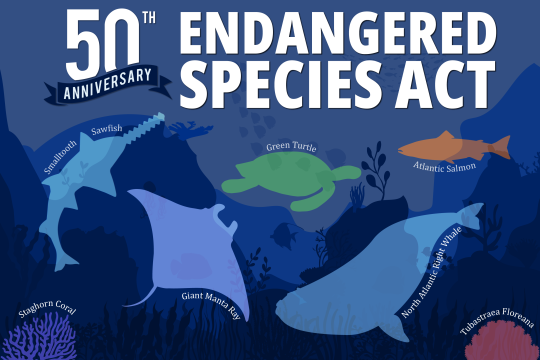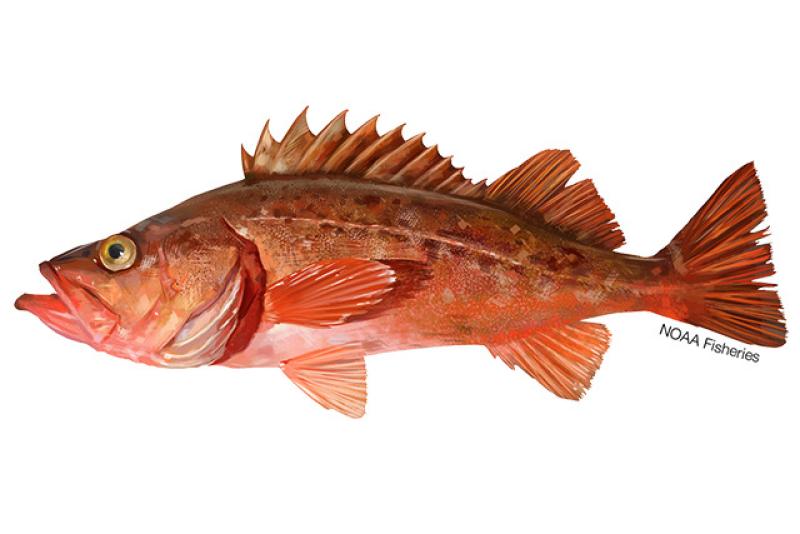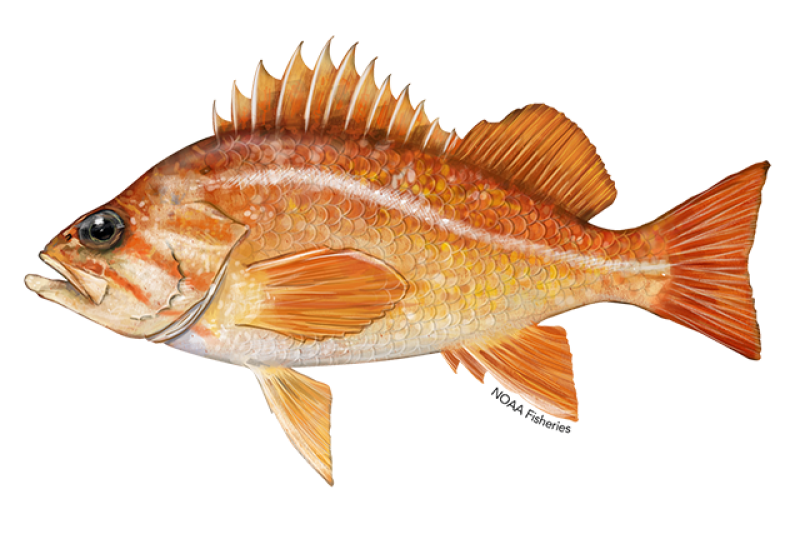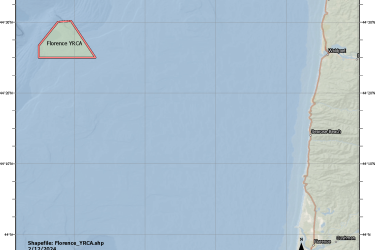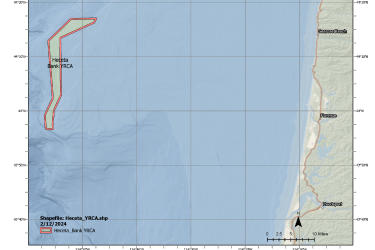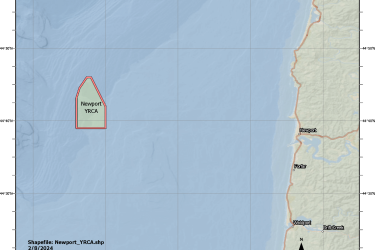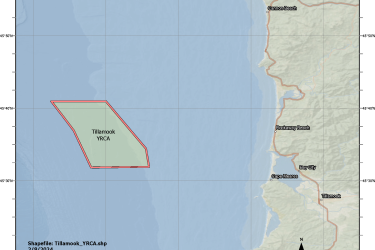Yelloweye Rockfish
Sebastes ruberrimus
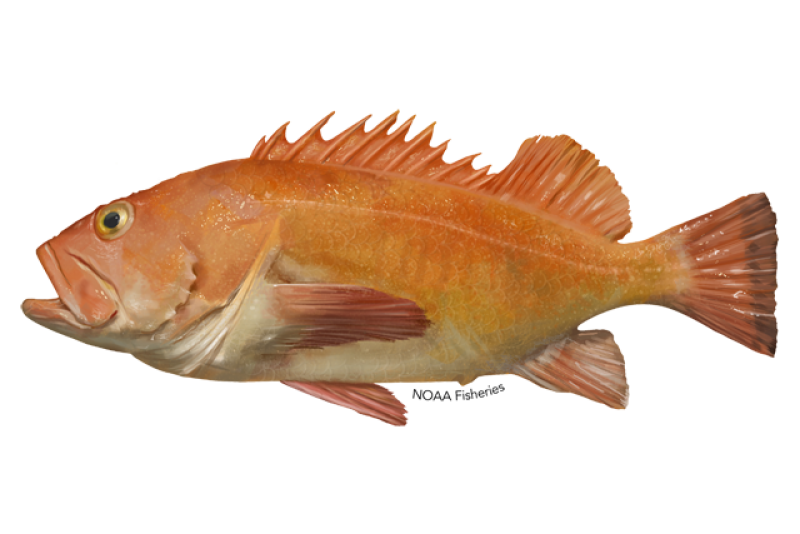
Protection Status
Quick Facts
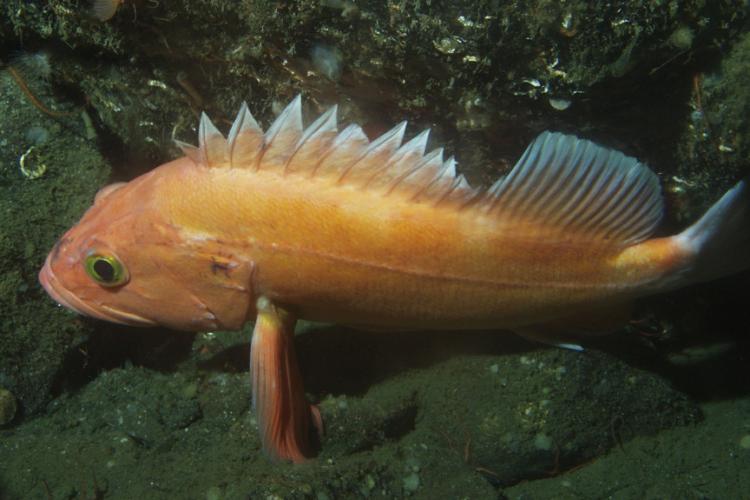 Yelloweye rockfish. Credit: Alaska Department of Fish and Game
Yelloweye rockfish. Credit: Alaska Department of Fish and Game
Yelloweye rockfish. Credit: Alaska Department of Fish and Game
About the Species
 Yelloweye rockfish. Credit: Alaska Department of Fish and Game
Yelloweye rockfish. Credit: Alaska Department of Fish and Game
Yelloweye rockfish. Credit: Alaska Department of Fish and Game
Yelloweye rockfish are among the longest lived of rockfishes, with maximum age reported to be up to 150 years. This species also is very slow growing and late to mature. Although conservation measures like fishing bans have been put in place in Puget Sound, recovery from threats such as past overfishing and continued bycatch will take many years due to the life history of yelloweye rockfish. The Puget Sound/Georgia Basin distinct population segment (DPS) in Washington State is listed as threatened under the Endangered Species Act.
Non-ESA listed populations of yelloweye rockfish are harvested in commercial and recreational fisheries off the West Coast and Alaska. Fisheries harvest of yelloweye rockfish is managed under the following Fishery Management Plans (FMPs):
- Pacific Coast Groundfish FMP
- Groundfish of the Gulf of Alaska FMP
- Groundfish of the Bering Sea and Aleutian Islands FMP
Learn more about the Pacific Coast Groundfish Fishery off the West Coast
Assessment of the Other Rockfish stock complex in the Gulf of Alaska (PDF, 49 pages)
Assessment of the Demersal Shelf Rockfish Stock Complex in the Southeast Outside Subdistrict of the Gulf of Alaska (PDf, 17 pages)
Population Status
NOAA Fisheries is committed to conserving and protecting yelloweye rockfish. Our scientists and partners use a variety of innovative techniques to study, learn more about, and protect this species.
Threats
Yelloweye rockfish were once part of a vibrant recreational and commercial groundfish fishery in Puget Sound. Because all rockfish species are an important part of the food web, actions to support rockfish recovery would benefit the Puget Sound ecosystem. For instance, larval and juvenile rockfish are a food source for juvenile salmon and other marine fish and seabirds.
Many rockfish species do not begin to reproduce until they are 5 to 20 years old, their recruitment varies from year to year and reproductive success occurs at the right combination of temperature, food supply and upwelling intensity. Therefore, these species are dependent on maintaining extended population age structure, and thus very susceptible to overfishing and habitat degradation.
Washington State has closed many commercial fisheries that caught rockfishes incidentally, and there is no direct commercial harvest of them in Puget Sound. Recreationally, targeting or retaining any species of rockfish in Puget Sound waters east of the Port Angeles area is not allowed.
Through work with our partners, we have supported a number of rockfish recovery actions, including derelict fishing gear surveys (PDF, 19 pages) and prevention (PDF, 15 pages) efforts, kelp conservation and recovery, the distribution of descending devices to recreational anglers, unique habitat and fish surveys, and the development of outreach materials.
Scientific Classification
| Kingdom | Animalia | Phylum | Chordata | Class | Actinopterygii | Order | Scorpaeniformes | Family | Sebastidae | Genus | Sebastes | Species | ruberrimus |
|---|
Last updated by NOAA Fisheries on 05/17/2023
Featured News
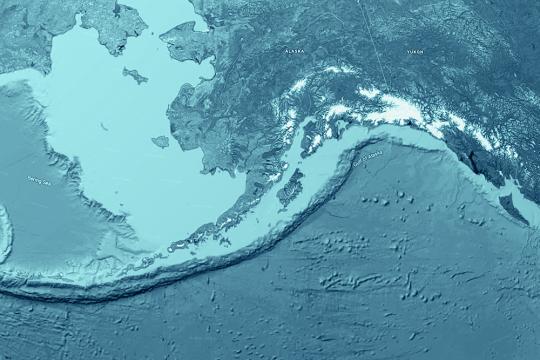 3D render and imaging of topographic map of Alaska showing the Gulf of Alaska, Aleutian Islands and Bering Sea. Satellite images courtesy of NASA. Credit: Frank Ramspott
3D render and imaging of topographic map of Alaska showing the Gulf of Alaska, Aleutian Islands and Bering Sea. Satellite images courtesy of NASA. Credit: Frank Ramspott
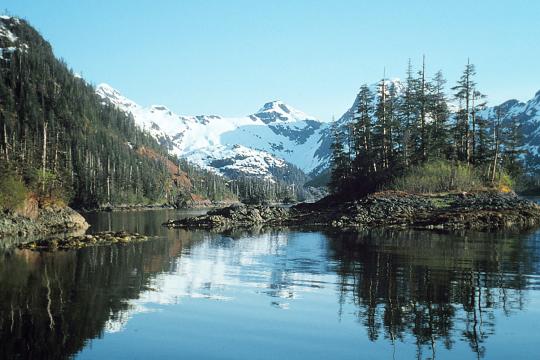 Snow capped mountains reflect off the waters of the Prince William Sound in the Gulf of Alaska. Credit: NOAA Fisheries.
Snow capped mountains reflect off the waters of the Prince William Sound in the Gulf of Alaska. Credit: NOAA Fisheries.
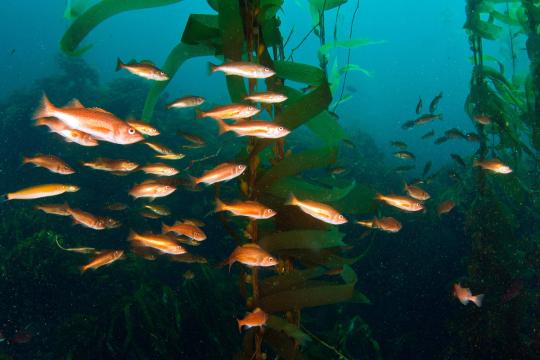 A type of rockfish, bocaccio take 20 years to mature and can live longer than 120 years. Credit: Adam Obaza/Paua Marine Research Group.
A type of rockfish, bocaccio take 20 years to mature and can live longer than 120 years. Credit: Adam Obaza/Paua Marine Research Group.
Management Overview
The Puget Sound/Georgia Basin DPS of yelloweye rockfish in Washington State is listed as threatened under the Endangered Species Act.
Recovery Planning and Implementation
Recovery Plan
This recovery plan outlines actions and research for the conservation and survival of threatened yelloweye rockfish and endangered bocaccio using the best available science per the requirements of the Endangered Species Act (ESA).
- Yelloweye and Bocaccio Rockfish Recovery Plan
- Remotely Operated Vehicle Surveys
- Collaborative Genetic Research
Kelp Conservation and Recovery Plan
Kelp is a vital habitat for rockfish and numerous additional species including forage fish, invertebrates, birds, and salmon. We have partnered with a consortium of regional kelp experts to develop the Puget Sound Kelp Conservation and Recovery Plan, which was released in May of 2020.
Learn more about kelp conservation
Critical Habitat for Puget Sound/Georgia Basin Rockfish
In 2014, NOAA Fisheries issued a final rule to designate critical habitat for the threatened yelloweye rockfish (Sebastes ruberrimus) Distinct Population Segment (DPS) under the Endangered Species Act.
Learn more about the critical habitat designation for Puget Sound/Georgia Basin Rockfish
Conservation Efforts
Washington Department of Fish and Wildlife Permit Applications
The Washington Department of Fish and Wildlife (WDFW) developed a conservation plan to minimize and mitigate negative effects on listed species as a result of fisheries management measures in Puget Sound/Georgia Basin. These measures potentially affect nine ESA-listed fish populations, including yelloweye rockfish. This conservation plan was developed as part of WDFW’s application for an incidental take permit under the ESA. Following a public comment period, we issued the incidental take permit on November 6, 2012.
For more information, see the materials below or contact Dr. Dayv Lowry, (253) 317-1764.
- ESA Section 10 Incidental take Permit (PDF, 6 pages)
- Final Environmental Assessment (PDF, 145 pages)
- WDFW Proposed Fishery Conservation Plan (PDF, 83 pages)
- WDFW ESA Section 10 Incidental Take Permit Application (PDF, 18 pages)
- WDFW Final Environmental Impact Statement
Salish Sea Rockfish Recovery Workshop, June 2011
The Rockfish Recovery in the Salish Sea: Research and Management Priorities Workshop on June 28-29, 2011 brought together scientists, managers, and industry professionals. Their focus was on recent and on-going research and recovery efforts of rockfish and their habitats in the Salish Sea to enable further collaboration. This workshop specifically focused on rockfish in the Salish Sea because of its unique and diverse habitats and its complex socioeconomic dynamics that influence rockfish research and recovery measures.
View presentations from the workshop
Stewardship Resources
Regulatory History
In February 1999, we received a petition from Mr. Sam Wright of Olympia, Washington to list 18 species of marine fish in Puget Sound, including this species, under the ESA. On June 21, 1999, we found that there was insufficient information concerning stock structure, status, and trends for this species to suggest that listing this species may be warranted (64 FR 33037).
On April 9, 2007, we received a petition from Mr. Sam Wright (Olympia, Washington) to list "distinct population segments (DPSs)" of yelloweye rockfish, and four other rockfishes in Puget Sound, as endangered or threatened species under the ESA and to designate critical habitat. We found that this petition also did not present substantial scientific or commercial information to suggest that the petitioned actions may be warranted (72 FR 56986; October 5, 2007). On October 29, 2007, we received a letter from Mr. Wright presenting information that was not included in the April 2007 petition, and requesting reconsideration of the decision not to initiate a review of the species' status. We considered the supplemental information as a new petition and concluded that there was enough information in this new petition to warrant conducting status reviews of these rockfishes. We completed the status review in December 2010.
In April 2010, we listed the Puget Sound/ Georgia Basin DPS as threatened under the ESA.
Key Actions and Documents
Last updated by NOAA Fisheries on 05/17/2023
Science Overview
Evaluating How an Oil Spill of Diluted Bitumen Could Affect Benthic Habitats in the Central Salish Sea
The Salish Sea, a cherished and biodiverse marine environment, is at risk for a major oil spill. Commercial marine traffic has been increasing, expanding the risk of a major oil spill from oil transport, as well as from bunker fuels from other vessels. Transport of diluted bitumen (dilbit), a type of heavy oil that can sink to the seafloor and accumulate in troughs and canyons, presents unique challenges for protection of benthic habitats critical to rockfishes and other bottomfish.
A recent collaborative research project led by the Tombolo Mapping Laboratory has used tide and current predictions, sediment transport and deposition models, intimate knowledge of geomorphology, and fish distribution data to identify potential impacts of spilled dilbit in the central Salish Sea (the San Juan Archipelago). They predict where dilbit is likely to become embedded in rocky crevices, be dispersed by strong currents, accumulate and settle into sediments, or be trapped in bays. They also identify important benthic habitats likely to lie in the path of spilled and sunken oil released from various locations.
A draft report and companion maps are available below and will be submitted to the peer-reviewed journal Continental Shelf Research. An Esri StoryMap is also available that summarizes this work using interactive and engaging maps.
Report
Maps
Plate 1 - Oil Spill Assessment Map – Behavior and Fate of Dilbit in the Central Salish Sea (PDF, 1 page)
Plate 2 - Oil Spill Assessment Map – Selected Potential Critical Benthic Habitats in the Central Salish Sea (PDF, 1 page)
StoryMap
Oil Spills and Benthic Habitats in the Salish Sea
Citizen Science Young of Year (YOY) Rockfish SCUBA Survey Project
Rockfish Need your Help!
Rockfish in Puget Sound form part of the diverse marine community that attracts thousands of divers each year, yet monitoring rockfish populations is challenging due to their habitat usage and sporadic occurrence in Puget Sound. We must collect a large amount of information to assess rockfish recovery and divers can help! A large-scale effort is underway to measure recruitment of young of year (YOY; fish that have not yet reached one year of age) and we are engaging scuba divers to assist.
Why are we interested in YOY rockfish?
Assessing the numbers and locations of YOY rockfish will help us understand preferred habitats and population characteristics. Collecting this data across multiple years and comparing it with oceanic and climatic variables could clarify conditions that lead to successful reproduction. This effort is a key part of understanding what conditions lead to successful survival of young rockfish.
How can recreational divers help?
Download our YOY survey guide linked below and conduct your own survey! Also, if you spot a YOY yelloweye rockfish, canary rockfish, or bocaccio while scuba diving, snap a picture and note your location. Then send it to us at rockfishid@noaa.gov. It's that simple! If you are not sure of the species, send it to us anyway.
Where can I find rockfish while diving?
Rockfish can be found anywhere in Puget Sound (including the San Juan Islands), and having both presence and absence data from diverse locations is key to describing settlement patterns. Working with partners, we recently developed a monitoring plan for index sites throughout Puget Sound to guide long-term survey efforts. In addition to index sites, this plan needs observations from randomized sites throughout the region. YOY rockfish can be found in various habitats, so we encourage you to branch out and try sites that may feature eelgrass, kelp, rocky reef, or soft-bottom—then be sure to report your data. You never know when you'll find a new favorite dive site!
To prepare for participation, check out our YOY survey guide for instructions and assistance with species identification. Most importantly, keep diving in Puget Sound and start (or continue) keeping an eye out for juvenile rockfish!
- YOY Rockfish Citizen Science Survey Guide (PDF, 2 pages)
- Download the flier (PDF, 1 page)
- Rockfish Identification
- 2015–2020 Rockfish YOY Summary Report (PDF, 23 pages)
Is your dive club interested in learning more about rockfish?
We would be happy to speak at your dive club and will do our best to make it to one of your meetings. For more information, you may contact:
- James Selleck, james.selleck@noaa.gov
- Adam Obaza, adam@pauamarineresearch.com
- Dr. Dayv Lowry, david.lowry@noaa.gov
NOAA Fisheries' Funded Research Projects That Inform Recovery Planning
NOAA Fisheries funds several projects with key research partners to inform rockfish recovery planning.
- Documenting Rockfish Bycatch in, and Removing Derelict Shrimp Pots with a Remotely Operated Vehicle (PDF, 16 pages)
- Rockfish Hot Spots: Identifying Rockfish Hot Spot Areas in Puget Sound Through a Spatial Analysis of "Grey" Data, September 2016 (PDF, 24 pages)
- Bycatch of rockfish in spot prawn traps and estimated magnitude of trap loss in Washington waters of the Salish Sea (PDF, 18 pages)
- Evidence of habitat associations and distribution patterns of rockfish in Puget Sound from archival data (1974–1977) (PDF, 36 pages)
- Puget Sound Derelict Gillnet Prevention Report (PDF, 15 pages)
- Angling for Insight: Examining the Recreational Fishing Community's Knowledge, Perceptions, Practices, and Preferences to Inform Rockfish Recovery Planning in Puget Sound, Washington (PDF, 208 pages)
- NOAA Rockfish Cooperative Research Assessment Project (PDF, 24 pages)
- Deepwater Derelict Fishing Gear Removal Protocols (PDF, 26 pages)
- Spatial Distribution and Magnitude of Derelict Shrimp Pots and their Potential Impacts to Rockfish in Puget Sound (PDF, 41 pages)
- Deepwater Sidescan Sonar and Camera Surveys for Derelict Fishing Nets in Rockfish Habitat (PDF, 19 pages)
- Perceptions of Change in Puget Sound: Documenting Historical Trends in Abundance of Marine Species Using Local Knowledge (PDF, 17 pages)
Last updated by NOAA Fisheries on 05/17/2023
Documents
Economic Analysis of Critical Habitat Designation for the Georgia Basin/Puget Sound Distinct Population Segments of Yelloweye Rockfish, Canary Rockfish, and Bocaccio
The purpose of this report is to identify and analyze the potential economic impacts associated…
Final Section 4(b)(2) Report for the Designation of Critical Habitat for Yelloweye Rockfish, Canary Rockfish, and Bocaccio
This report contains NOAA Fisheries West Coast Region’s analysis for designating critical habitat…
Biological Report for the Designation of Critical Habitat for Yelloweye Rockfish, Canary Rockfish, and Bocaccio
This report contains a biological analysis compiled by the Protected Resources Division of NOAA…
Yelloweye Rockfish and Bocaccio Recovery Plan
This recovery plan outlines actions and research for the conservation and survival of threatened…
Research
Ecosystem Science for Endangered and Threatened Rockfish in Puget Sound
In 2010, we listed Yelloweye Rockfish (Sebastes ruberrimus) and Canary Rockfish (S. pinniger) as 'threatened' and Bocaccio (S. paucispinis) as 'endangered' in Puget Sound, WA under the Endangered Species Act (ESA) due to large decreases in their…
Groundfish Catch Percentage And Value
During 2016, pollock made up 67% of the total groundfish catch off Alaska. The pollock catch for 2016 was 1,532,100 metric tons (t), up approximately 3% from 2015. The 2016 catch of flatfish, which includes yellowfin sole,…
Last updated by NOAA Fisheries on 05/17/2023
